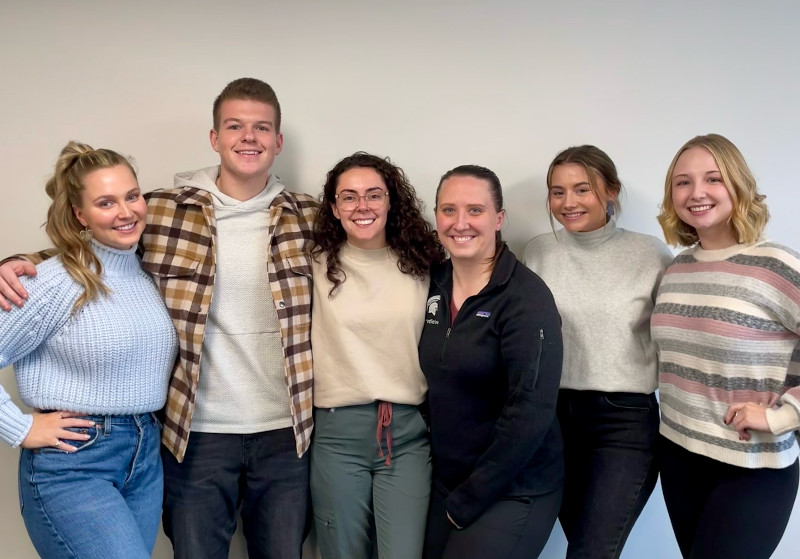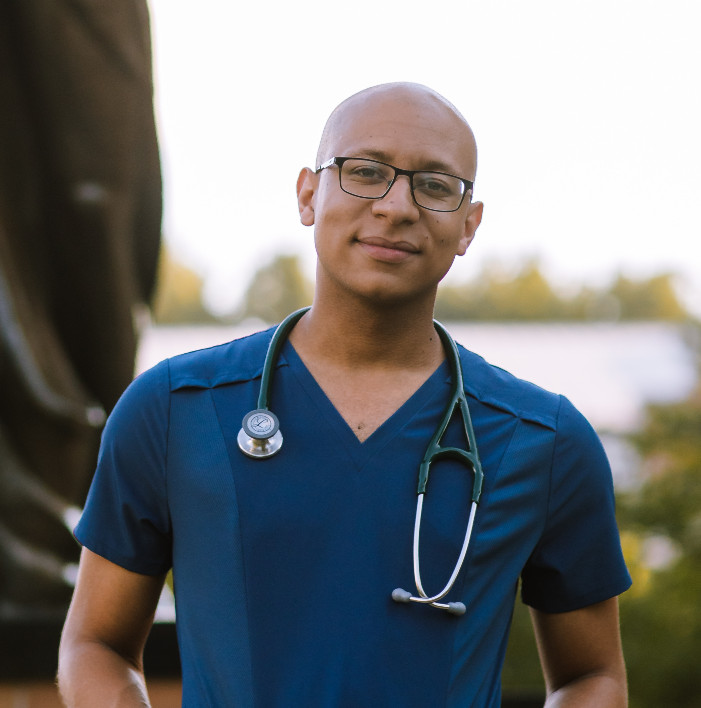As Michigan State University creates new career pathways across the university to educate and train the next generation of health care professionals to serve Michigan communities, current students share how they plan to make a difference in the state.
Donovan Dennis remembers what made him want to pursue pediatric health while studying for his bachelor’s degree at Brown University. Dennis, who studied public health as an undergraduate, closely followed the events of the Flint water crisis.
“I remember being in awe of Mona Hanna-Attisha, as both a pediatrician and activist,” said Dennis. Now, as a medical doctor/master’s in public health candidate in MSU’s College of Human Medicine, with a strong interest in pediatric health, he sees himself finding passion and fulfillment in doing similar community-minded work for children and families. “Serving as both a public health and medical advocate — just like Dr. Mona — is a serious goal of mine, and I hope to connect with her in the future as I learn and grow as a community health advocate and scholar.”
Integral to the mission of MSU’s health colleges is the need to address disparities in health care delivery across Michigan. Kendra Shannon is also pursuing a master’s in public health with the goal of serving communities that were particularly hard hit by the COVID-19 pandemic. Shannon previously worked in a COVID vaccine clinic, where she helped administer vaccinations to her community.
“I’m pursuing a public health degree because I realized that in the United States, health disparities within the Black American population run deep,” said Shannon.
While pursuing her master’s in public health in MSU’s College of Human Medicine, she was able to see firsthand that Black Americans have higher rates of diabetes, hypertension and heart disease. “The COVID-19 pandemic has impacted Black Americans disproportionately more than other populations in the U.S. and so, as a Black American, I asked myself, 'How can I help decrease these disparities?'”
Alex Lillie’s interest in pursuing her degree in MSU’s new Physician Assistant Medicine Program in the College of Osteopathic Medicine came from increasing news reports revealing the gaps and inequities in the current health care system. “The main reason that I chose to become a P.A. was to impact those who lack access to health care, whether it is a geographical discrepancy or an inability to schedule an appointment with a physician due to national shortage,” said Lillie.

P.A. Medicine students (L to R): Jill Risley, Mitchell Johnson, Alex Lillie, Ana Arnold, Lindsey Matsumoto and Taylor Miron
For physician assistant students like Lindsey Matsumoto and Mitchell Johnson, their interest in studying medicine came from a personal experience when they were patients and witnessed how physician assistants played an important role in their treatment.
“I first learned about the P.A. profession as a patient in the hospital and I was really inspired by how physician assistants are able to show compassion and empathy while being able to provide quality health care,” said Matsumoto. “I am excited to use my current medical knowledge and work with future patients to show the same compassion and empathy that was once shown to me.”
“While being a patient with a traumatic injury, I saw how a P.A. can benefit everyone, and it really opened my eyes to the career,” said Johnson. “Physician assistants play such a vital role in health care by providing access and narrowing the health disparities gap, which drew me to the profession even more.”
Physician assistants play an active role in patient care by performing exams, diagnosing illnesses and prescribing medications. Taylor Miron found this part of the profession to be one of the main reasons she wanted to study this field and joined MSU’s program.
“What inspired my decision to become a P.A. was the ability to have a decision-making role in patient care and advocate for my future patients,” said Miron. “It is a profession that promotes lifelong learning and will always push me to be a better provider.”
Ana Arnold’s experience as a medical assistant exposed her to how physician assistants can help their patients by educating them. "One physician assistant who I worked with closely put a large emphasis on educating her patients and helping to increase the health literacy of the community,” said Arnold. “She extended this same attitude toward me, and her attitude and excitement for her role inspired me to pursue becoming a P.A.”
As a first-generation college student in the Physician Assistant Medicine program, Jill Risley had the opportunity to see what these providers experience on a day-to-day basis through virtual shadowing.
“I've watched the P.A. faculty handle every obstacle of launching a new program with grace while navigating COVID restrictions,” said Risley. “What has inspired me the most during my journey to becoming a physician assistant is the resiliency they possess."

